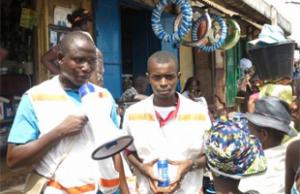Involving everyone: social mobilization is key in an Ebola outbreak response
“Our country has been hit by Ebola, a dangerous viral disease. The virus is dangerous, but you will not get infected if you follow our recommendations. Here is what you can do to protect yourself and your family.” The voice of a man in a Red Cross loudspeaker car drowns out the cries of market vendors and the noise of heavy traffic and a crowd of people starts to gather around the vehicle. It is Saturday and the busy marketplace of Matoto in the Guinean capital, Conakry, is full of vendors and shoppers.
Several people from Matoto have contracted Ebola and their family members and other contacts are being followed up for 21 days, which is longer than the infection’s period of incubation. The community is scared and upset and people are in need of accurate information.
“We are targeting our outreach activities to the districts where there have been cases of Ebola,” says Benjamin Pé Goumou, spokesperson of the Guinean Red Cross. “We ask people what they know about the disease and respond to their questions.”



